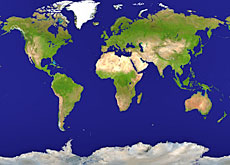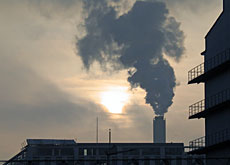Warmer oceans could drive up CO2 levels

The heating of the oceans could have an accelerating effect on global warming, research published by Swiss and North American scientists warns.
They found that the oceans’ capacity to act as a storehouse for atmospheric carbon dioxide (CO2) appears to be impaired by the gradual increase in water temperatures worldwide.
Around one half of the total CO2 released by humans each year is naturally absorbed by the oceans, which contain 60 times more carbon than the atmosphere.
To understand how the ocean carbon cycle can change, the scientists studied prior episodes of natural climate change.
Researchers from Zurich’s Federal Institute of Technology and from United States and Canadian universities compared carbon dioxide levels in seas from the last Ice Age with CO2 levels today and found that the colder waters retained more of the gas.
The results imply that the ocean is better at storing CO2 when it is cold as a result of physical changes in the global ocean circulation pattern. The results of the study were published in the latest edition of the science journal “Nature”.
“The exchange rates between the oceans and the atmosphere are what really dictate the amount of CO2 in the atmosphere and the ensuing temperatures,” co-author of the study Samuel Jaccard, from the Federal Institute, told swissinfo.
Climate predictions
Understanding how the oceans’ role will change in the years to come is very important for making long-term climate projections, he said.
As the oceans gradually warm due to greenhouse gas emissions, they will likely become a less secure storehouse of CO2, so that the atmospheric concentrations of CO2 will start to increase more rapidly than they do today.
Scientists already knew that atmospheric CO2 concentrations were lower in glacial periods when temperatures were colder, but the question of where the CO2 went had not been answered, Jaccard explained.
“We could show that most of the CO2 was stored in the ocean and in general oceans were more efficient in storing when they were cold,” Jaccard explained.
To carry out this research the scientists examined samples of mud taken from the ocean floor.
These 20,000-year-old samples were extracted about three kilometres under the surface of the northwest Pacific. The mud contains microscopic shells of tiny amoebas that act as time capsules of carbon data for the era.
Ice Age mud
The team also measured the chemical composition of thousands of samples of the Ice Age mud itself, looking for key indicators that could tell them about the CO2 dissolved in the deep Pacific waters.
They found clear evidence that those waters had very little dissolved oxygen remaining in them, which can only happen if those waters have built up large amounts of CO2
Earlier this week British-based environmental scientists revealed further evidence of the decline of the oceans’ role as an important repository for atmospheric carbon dioxide.
Results of the decade-long study in the North Atlantic by the University of East Anglia show that the uptake in this ocean, which is the most intense “sink” for atmospheric CO2, slowed down dramatically between the mid-nineties and the early 2000s.
The oceans are the heavyweight of the global carbon cycle, containing 60 times more carbon than the atmosphere.
They therefore have a large role in determining the atmospheric CO2 concentration.
About one half of the total CO2 released by humans each year is naturally absorbed by the oceans.
Any decrease in efficiency of the oceans in absorbing CO2 has serious implications for atmospheric CO2 levels and therefore global temperatures.
The data in the latest study comes from two ocean floor sites in the Gulf of Alaska and the northwest Pacific.
The scientists studied samples from sediment cores retrieved from undersea mountains in waters close to freezing at depths of more than 3km.

In compliance with the JTI standards
More: SWI swissinfo.ch certified by the Journalism Trust Initiative



You can find an overview of ongoing debates with our journalists here. Please join us!
If you want to start a conversation about a topic raised in this article or want to report factual errors, email us at english@swissinfo.ch.